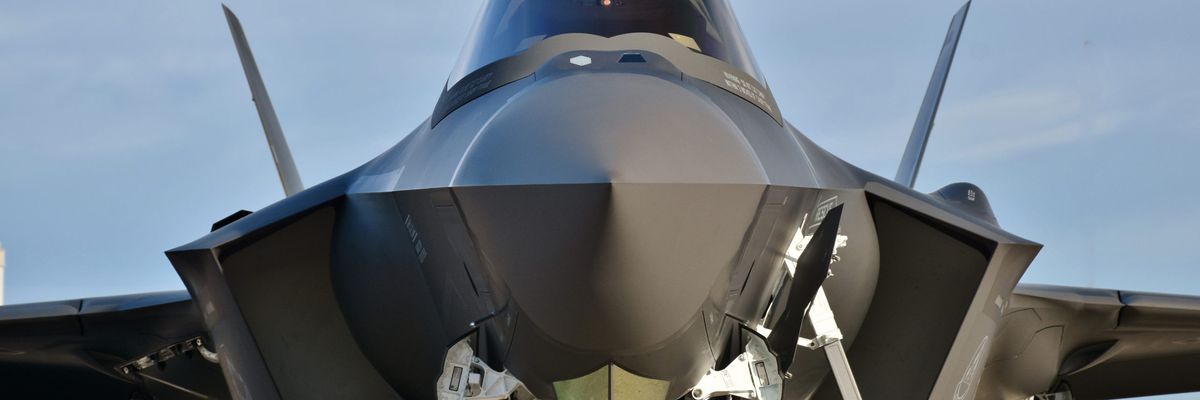Across the country people are rightfully protesting systematic racism and the failures of their police departments. The COVID-19 pandemic has killed over 177,000 people since January. Millions of people are newly unemployed, and millions face evictions. And the new $740 billion military budget passed by Congress didn’t prevent and doesn’t address any of these immediate threats.
The ability to tackle these threats exists, just not in the military. Instead, our military spending draws resources away from programs and departments that have the ability to create safety rather than add to the chaos. In the midst of a pandemic it is absurd that the budget for the Department Health and Human Services is a fraction of what the military receives. The Pentagon, like the police, should be defunded.
The initial proposed Pentagon budget for this year is $740.5 billion, which is more than half of the annual discretionary budget. The budget fails to address the hundreds of thousands of fatalities in the U.S. from COVID-19. Our “national security” spending is supposed to keep us safe, yet hundreds of thousands of people have died and millions more are struggling. Instead of focusing on protecting the lives of people in the country, plans have been proposed for the modernization of nuclear weapons and the resumption of nuclear testing, both which create danger rather than security and ignore the actual problems we face. The Air Force's accidental leak of their hope to obtain a hypersonic nuclear weapon further illustrates the military’s misplaced focus. Nuclear weapons cost taxpayers around $22.4 billion a year, a monster number compared to the Centers for Disease Control and Prevention, which for the fiscal year of 2020 received less than $7 billion. At a time when there is a pandemic, massive unemployment, and other issues raging in the country, creating new and dangerous toys is unreasonable and inconsiderate.
The pandemic has made programs that fall under the discretionary budget such as food assistance for Women, Infants, and Children and the Workforce Investment Board that helps the unemployed find jobs even more important. As the military budget grows, which it has each year since 2016, funding for most of these programs and their departments tend to shrink. This is true of the Department of Education, whose budget was proposed to be cut by 8 percent or $6.1 billion dollars for 2021. Defunding the Pentagon would mean reallocating parts of its budget to departments and programs like these which are better equipped to manage the real threats to the people’s security.
Had funding in the past been better invested in nonmilitary priorities, we would be better off now. Pertinent departments would be better equipped to handle the shockwaves from the pandemic. An example of this is in the economic security category of the discretionary budget. In 2019 these programs received $87 billion for housing, the homeless, and food and nutrition programs. Increased levels of income loss coupled with food insecurity because of the pandemic exacerbated the financial strain on these programs, forcing them to receive further aid from the CARES Act.
Emergency and major relief packages like the CARES Act were needed immediately and picked up where non-military departmental and program funding fell short. The $2 trillion economic rescue package filled in the gaps caused by the pandemic, such as in unemployment and healthcare programs. But in the future, we need to rebalance the funding so relief needs are not as high.
In July, Senators Bernie Sanders, Edward Markey, and Elizabeth Warren, and Representatives Barbara Lee and Mark Pocan introduced an amendment to the National Defense Authorization Act that would have reduced the topline military budget by 10 percent, freeing $74 billion dollars to be redistributed to other departments. While this unfortunately failed to pass, it cannot be the end of the fight to defund the military. The Pentagon could be defunded by 50% and the United States would still have the largest military budget in the world. This would allow for $370 billion dollars to be reallocated to programs directly benefiting people. That could fund 10.3 billion COVID-19 tests a year or create over 6 million jobs.
Our current level of military spending wastes resources on senseless instruments of destruction, while failing to address the security threats that people in the country actually face. Even worse, it draws resources away from departments that address these security threats to the country. It is vital that we, as well as lawmakers, continue working to defund the military in order to free up and allocate resources to match the priorities and needs of the people in this country.
















